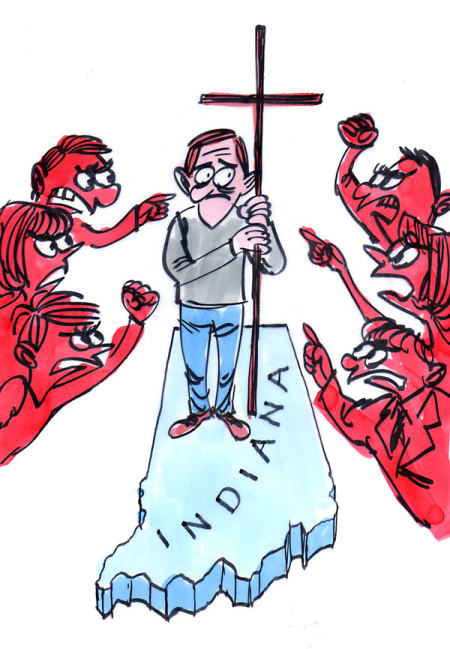Analysis: 8 Reasons Conservative Christians Are Concerned About Their Own Religious Freedom in the Obama Era

While conservative Christians have long fought for the religious freedom of religious minorities, they have become increasingly concerned about their own religious freedom in recent years. Here are 8 reasons that is happening.
1. Same-Sex Marriage
Some conservative Christians have long been warning that same-sex marriage presents a danger to the religious freedom of those Christians who believe true marriage can only be between a man and a woman. Those who sounded those warnings were accused of sensationalism; they were only making those claims to fan the flames of opposition to SSM, it was said at the time. We now know that they were right all along. SSM supporters who only a few years ago claimed that SSM would not infringe upon anyone's religious beliefs are now openly defending government coercion of SSM opponents.
Wedding vendors, like photographers, florists and bakers, have been on the front lines of these religious freedom battles. Even though there are plenty of wedding vendors not opposed to serving a same-sex wedding, and the brides or the grooms have usually stated that they preferred vendors who support SSM, there have been several instances where conservative Christian wedding vendors have been punished for declining to serve a same-sex wedding. In some cases, the punishments are so severe that these vendors will not only be put out of business but their life savings will be wiped out.
If those in powerful political positions believe that those opposed to SSM should be forced to choose between violating their religious conscience or personal financial ruin, they cannot be counted on to defend the religious freedom of conservative Christians.
Additionally, since SSM supporters lied about their support for religious freedom when they were pushing for passage of gay marriage, what are they lying about now? Churches will not be required to perform gay weddings, they say; pastors who denounce homosexuality will not lose their tax-exempt status, they say, or be imprisoned for hate speech, they say; but why should they be trusted? How far do liberals want to go in their use of government force to infringe upon the religious freedom of conservative Christians?
2. Anti-Christian Hostility
In their 2015 book, So Many Christians, So Few Lions: Is There Christianophobia in the United States? sociologists David Williamson and George Yancey document anti-Christian hostility among certain liberal activists. While these activists are small in number, they tend to be powerful elites, which provides them with much cultural and political influence.
Through interviews with some of these anti-Christian liberals, Williamson and Yancey reveal what conservative Christians have long felt to be true: there are influential people, in politics, the media and entertainment, who despise them and wish to marginalize them as much as possible.
3. Gordon College and Brendan Eich
For a preview of what could be next, look to Gordon College and Brendan Eich.
Gordon's president, D. Michael Lindsay, signed a letter to President Barack Obama asking him to include a religious exemption in his employment non-discrimination executive order. The exemption would not have benefited Gordon College directly and it was the same exemption that was already passed by a Democratic-controlled U.S. Senate. Additionally, the letter was also signed by Obama supporters and was organized by Michael Wear, who had worked for the Obama's White House and his 2012 election campaign.
Despite all that, Gordon has been targeted because the Christian college has a conduct policy that bans sexual relations between same-sex partners. A Massachusetts city terminated a contract with the college, and it is being investigated by its accreditor.
Brendan Eich was forced out of his job as the CEO of Mozilla because he had donated $1,000 to a campaign in support of an amendment to California's state constitution to define marriage as between one man and one woman.
Both of these cases could be a preview of things to come. Will Christian colleges guided by Christian principles lose their accreditation? Their tax exempt status? Will their students be denied government aid? Will Christians opposed to SSM be allowed to hold any high profile jobs?
4. Reactions to RFRA
The notion that those with religious objections to SSM should not be given religious freedom can also be seen in last week's reactions to the Religious Freedom Restoration Act.
RFRA was strongly supported by both liberals and conservatives in the 1990's when it was first passed at the federal level in reaction to members of the Native American Church who were punished after they used peyote, an hallucinogenic drug, as part of a religious worship service. After realizing that RFRA also protects conservative Christians, not just religious minorities, liberals have begun opposing it.
Most of the media coverage last week about RFRA has failed to inform the public of why the law is important. Worse still, the media has misinformed about what the law actually does.
One of the arguments liberal news sites used in announcing its opposition was that certain conservative Christians supported the law. If conservative Christians are for it, it must be a bad law, appears to be the reasoning.
On Thursday, liberal Washington Post columnist Eugene Robinson called for the repeal of all RFRA laws. Similarly, in a Wed. op-ed for The Daily Beast, Michael Tomasky denounced RFRA and argued that those whose religious beliefs are opposed to SSM should not be provided any legal accommodation.





















